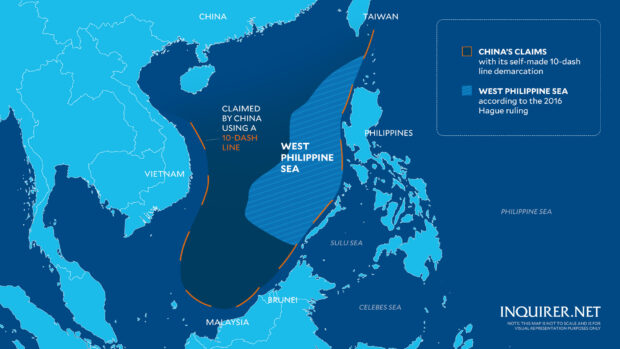Senate tackling measures to address West Philippine Sea issues

This map is not to scale and is for visual representation purposes only. Graphics by: Samuel Yap / INQUIRER.net
MANILA, Philippines — Certain measures which could help alleviate tensions in the West Philippine Sea (WPS) are already being tackled in the Senate, said senators on Tuesday.
Senate President Francis Escudero said these measures include the Maritime Zones Act and the Philippine Archipelagic Sea Lanes Act.
“What we are taking up are bills (Maritime and Sea Lanes) that seek to strengthen our legal claim and position on the West Philippine Sea vis-a-vis other claimant countries and bills that seek to strengthen our Armed Forces to be a deterrent,” Escudero told reporters.
The Maritime Zones Act specifies the rights and entitlements of Filipinos over the country’s maritime zones, including underwater features.
It has been ratified by Congress but was recalled by the House of Representatives in May for further refinement.
The Philippine Archipelagic Sea Lanes Act, on the other hand, seeks the creation of a system of sea lanes along the country’s waters by connecting the coordinates of several access lines.
It is among the bills the Legislative-Executive Development Advisory Council declared a “priority” for passage by June 2025.
Escudero, however, said that the easing of tensions in the West Philippine Sea would still depend on the “action/initiative of the Executive Branches of both [the Philippines and China] given that the Head of State is the Chief Architect of a country’s foreign policy.”
Meanwhile, Sen. Loren Legarda said the Blue Economy Act could also alleviate tensions in the disputed waters.
She explained that unlike other economic measures, the Blue Economy Act “takes into account the science of ocean management to get more out of the ocean accounts and for longer.”
“By using blue bonds, understanding ocean processes, and implementing holistic and sustainable policies, we can reduce tensions in our EEZ (exclusive economic zone) through business and partnerships,” Legarda said.
Senate Minority Leader Aquilino “Koko” Pimentel III, for his part, stressed the need for legislation “which can help develop our diplomatic skills and prowess as well as funding for [the] Department of Foreign Affairs.”
Both the Philippines and China have been embroiled in a territorial dispute after the latter claimed the majority of the South China Sea, including the West Philippine Sea, through its so-called ten-dash line.
China’s claims, however, have been effectively invalidated by a July 2016 international tribunal ruling that stemmed from a case filed by Manila in 2013.
Despite this, China has continued encroaching Philippine waters, continuing its aggression and militarization even in areas of the Philippines’ territory in the West Philippine Sea.
For comprehensive coverage, in-depth analysis, visit our special page for West Philippine Sea updates. Stay informed with articles, videos, and expert opinions.


















